Who is your favorite fictional character of all time?
In this exact moment it is a three-way tie: Achilles, Omar Little (The Wire), and Sherlock Holmes.
Who is your favorite fictional character of all time?
In this exact moment it is a three-way tie: Achilles, Omar Little (The Wire), and Sherlock Holmes.

This week's literary highlights from across the world
Writing is a notoriously penny-pinching métier, unless you’re Canadian Nobel winner Alice Munro—whom the Canadian government has graced with a $5 commemorative coin of her very own. Don’t count on making literary purchases with the coin any time soon, though: the coin costs $69.95, which—granted, we aren’t mathematicians here at Asymptote—seems like a not-so-smart investment. READ MORE…
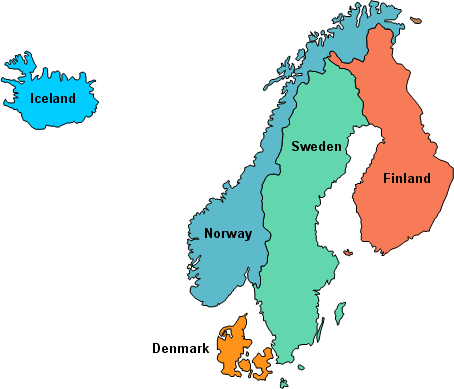
"The linguistic closeness is a false cognate for cultural closeness. And for that, we can't blame the translators."
My chair is uncomfortable, I don’t understand Danish, and it smells like someone in my general vicinity had kippers for dinner. I’m at the Oslo Central Library’s panel discussion on “What is good Scandinavian literature?,” and it isn’t going well. READ MORE…
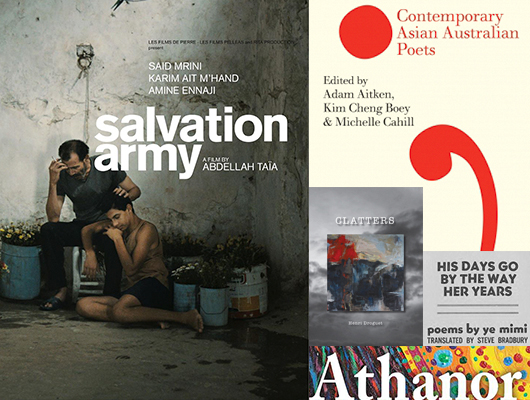
From films to exhibitions, here's what Asymptote contributors have been up to lately.
Coming May 7, 2014! Moroccan writer Abdellah Taïa’s widely anticipated screen debut L’armée du salut (Salvation Army) has been making waves at film festivals. Watch an excerpt of the prize-winning movie here and find out more on Taïa’s official Facebook page. For French speakers: a French-language interview with Taïa. Revisit his open letter “Homosexuality Explained to My Mother,” translated into English and Chinese exclusively for Asymptote here.
Alexander Dickow brings Henri Droguet’s poetry to the United States for the first time with Clatters. Published by Rain Taxi imprint Ohm Editions, Droguet’s French text appears beside Dickow’s translation. In the translator’s afterword, Dickow opines: “Never, perhaps, has so pure a litany of despair, vanity, destruction and decay given rise to such vibrant language.” Lovely!
Moving away from the Francophone world… Boey Kim Cheng co-edited a crucial anthology of Asian Australian poetry–get up to speed with the project here. His own poem “Plumb blossom or Quong Tart” appears with voices “from Pakistan to Singapore to Thailand to Goa and beyond, telling diverse, richly textured and evolving stories.”
Forrest Gander is speaking tonight, March 26, at SOAS, University of London, about modern and contemporary Japanese poetry in translation and how it has influenced literature originally written in English. He will tackle the question so many readers have only wondered at: What gets translated and why? Join him and Asymptote contributing editor Sayuri Okamoto.

Featuring work by John Smelcer, who can read and write in Ahtna, one of the world's most endangered languages
Recipe for a Reztini
Two parts cheap gin or vodka
One part of your youth
Garnish with a strip of dried salmon or jerky
Shake it in the backseat of a Pontiac
doing 70 mph on Dead Man’s Curve
***

A look at some of the most important literary news of the past week
Spring has sprung today, but it’s more than likely the weather is still less-than-stellar, wherever you are. At the New York Review of Books, British novelist Zadie Smith eulogizes the seasons in the shadow of climate change. Elsewhere, watch a conversation between Smith and Nigerian-American author Chimamanda Ngozi Adichie on writing postcolonial literature, or read about Adichie’s literary Lagos.
Fellow Nigerian-American writer Teju Cole posted his essay A Piece of the Wall, on immigration, entirely on Twitter (here’s how the social media platform is changing the face of fiction, despite griping critics). Themes of diaspora and identity certainly resonate with readers: Zimbabwean writer NoViolet Bulawayo has snagged the PEN/Hemingway Award for her novel We Need New Names, about a 10-year-old girl moving to the United States. But don’t make these mistakes when reading immigrant fiction: a view from Germany, via our friends at Words Without Borders.
Last night, at an intimate jazz bar hidden away on one of Berlin’s many courtyards, Readux books presented its gorgeous second set of books. Hardly larger than the next generation of cell phones, these little books are designed for brief escapes, mini-breathers away from your screen (although they’re of course also available as ebooks, who are we kidding?).
There were readings, short discussions, and delicious and plentiful vodka tonics, spring was very much in the air—it’s no coincidence that these books do well on lunch-break benches underneath Berlin’s tender first blossomings. READ MORE…
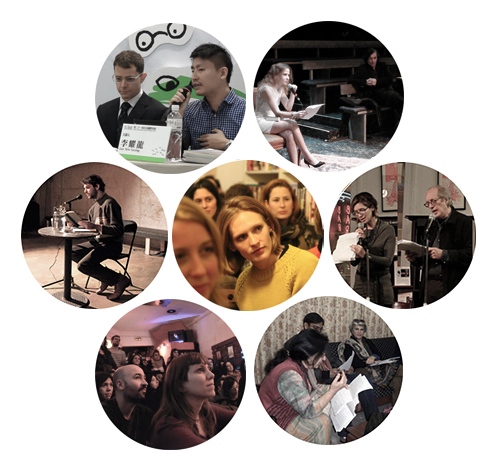
Check out highlights from our past celebrations in London and New York, and don't miss our upcoming events!
We’re thrilled to announce that Asymptote’s globetrotting third anniversary party, which kicked off in London and New York in January, will continue across five continents over the next month—watch our brand-new video trailer below for a taste, and don’t forget to RSVP at our Shanghai (March 29), Philadelphia (March 29), Berlin (April 3), and Sydney (April 11) Facebook Event pages, already live.
In case you can’t make it, don’t fret: we’ve launched a new Events page, where you can find photos, podcasts, videos, and dispatches of all the events we’ve ever organized, as well as an up-to-date pulse for all upcoming events!
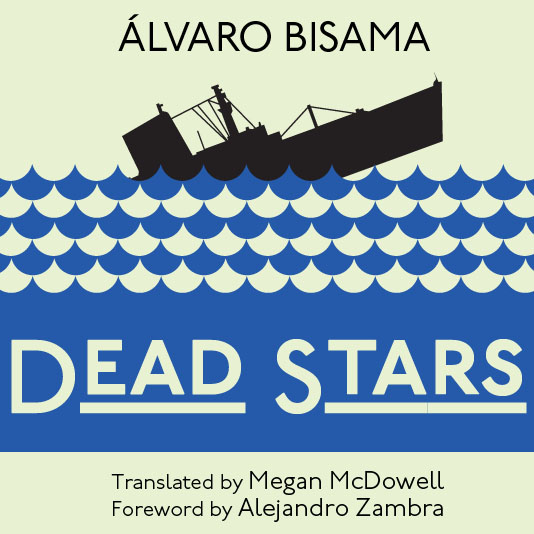
"The past is that: a photo taken in a hotel we wish was our home—false photographs, proof of the life we never had."
Forthcoming from Ox and Pigeon Press is Megan McDowell’s English translation of Álvaro Bisama’s Dead Stars, which won the 2011 Santiago Municipal Prize for Literature and the 2011 Premio Academia, given out by the Chilean Academy of Language for the best book of 2010.
Álvaro Bisama’s award-winning novel Dead Stars is a story-within-a-story set against the backdrop of Chile’s transition to democracy after decades under the Pinochet dictatorship, filled with characters desperately searching for a way to escape their past, their present, their future: a small-town metalhead; left-wing revolutionaries without a new cause; a brotherhood of cough syrup addicts; punks, prostitutes, and thieves. Through them, Bisama’s tragic novel explores how our choices, the people we know, the places we pass through, and the events of our lives exert an unsuspected influence long after their light has gone out and they have faded from our memory (Ox and Pigeon).
***
Javiera failed almost all of her classes. We always used to put her name on our assignments. That way she’d come closer to passing her courses. I made that gesture, same as Donoso, and Luisa, our classmate who was going out with Charly Alberti, the drummer from Soda Stereo.
You’re fucking with me, I said.
Seriously, that’s what she said, that she was Charly Alberti’s girlfriend, that he was crazy about her and sometimes he’d sneak away to Chile in secret to see her. Donoso and I knew about it. No one else. Not even Javiera, unless Donoso told her. But I don’t think he did. Donoso was very discreet. But that’s what Luisa told us. She confessed one time when she was drunk, and it was all downhill from there. She was always telling us the gory details about her and Alberti. She told us they’d spent the weekend in Reñaca, because he’d flown in on his private jet to show her his new album. She told us her parents knew about it. That it had been hard to convince her father, who was a cop and an evangelical, but Alberti had done it. That he was serious about their relationship. That he had been respectful of her. That she was still almost a virgin. I don’t know what she meant by that almost, but Donoso would hug her and sometimes she’d open her backpack and take out a giant album full of photos of Charly Alberti, a heavy book full of concert memorabilia, posters from TV Grama and VEA, and newspaper clippings. There was only one photo of them together, Alberti and Luisa, taken in the hallway of a hotel.
**
Her: Aside from many other things, the past is that: a photo taken in a hotel we wish was our home—false photographs, proof of the life we never had.
**
She said: But it doesn’t matter. The photo isn’t important. What’s important is Luisa’s role in all this, because I was with her when I saw Javiera and Donoso’s relationship start to go to shit. Because, even though she was a facha right-wing conservative, she went with me to a party thrown by the Youth League in a typographical union off Calle Colón. I don’t know why we went. Maybe we just wanted to relax. Or maybe it was easier to go there than home after classes. I don’t know. The fact is, we went. We killed time browsing thrift stores, and then we made ourselves up in the bathroom of a diner. Javiera and Donoso were at the party. We hadn’t seen much of them that semester. Javiera was in the middle of an appeal, trying to get them to let her take a class for the third time, and Donoso was busy at the restaurant. So, I went with Luisa to the party. She complained because they weren’t playing “Luna Roja,” and she insisted that Alberti was coming to see her that weekend. That she wasn’t going to drink too much because Alberti hated it when she drank, he detested drugs and alcohol. Of course, the party was full. I was drinking beer. I didn’t see Javiera anywhere. In the throng of people, I saw Donoso with a bottle of pisco in his hand. There were a few bands that played Andean music, and a couple Pablo Milanés clones. In between the bands, people danced. The party was fun, if you like that kind of thing. I didn’t really like it, but it wasn’t terrible. This was just before the mayoral election in Valparaíso. Back then, before the Spiniak case, that fat guy Pino was way ahead. At the university, someone said Javiera was going to run for council. I don’t know if it was just a rumor. It was probably true. The party would put any university leader up for election; they’d send whoever it was to campaign in villages out in the middle of nowhere, like Catemu or Puchuncaví. To us it seemed like an obvious thing that Javiera would be a candidate. So that’s how things were at that party: Luisa talking about Charly Alberti, Donoso drinking alone, Javiera nowhere to be found. The last thing I saw before disaster struck was this: Donoso sitting in a plastic chair clutching a bottle of straight pisco. That was the cut-off point, maybe. That was the moment when I lost sight of them, because Luisa went to the bathroom and she didn’t come back, and after a while someone told me: Your friend is in the bathroom crying. I went to find her. The bathroom was disgusting, but there was Luisa, sitting on the wet floor, hysterical. She had a piece of paper in her hand. A newspaper page. Luisa was holding a page from a newspaper or a magazine and sobbing hysterically. No, the fucker can’t do this to me, he can’t do this, Luisa said. I hugged her and she repeated it, he can’t fuck me over like this, he can’t do this to me, the motherfucker, she was saying, sniffling. I hugged her and she was pretty drunk and then I saw that page in her hand. There was Charly Alberti with his bride, a model. That’s why Luisa was crying. Because of that page she found on the floor of the bathroom or in the hallway. A social page, a page with the kind of short articles that close every edition of a paper. That loose page, lost at the party, a little bit of trash just like the one you have in your hands now, the newspaper page that shows Javiera with white hair. It’s like someone let these articles loose in the wind, waiting for someone else to see them and break down, just like I’m doing now, man, just like Luisa broke down then.
**
The past is always a newspaper page left behind on the ground, she said.
**
She said: But then something happened. While I was hugging Luisa, we heard noises coming from the men’s bathroom. Shouts. We heard something break. A mirror. A woman’s voice screeching: Let him go, you asshole, let him go! Then more voices. Let him go, man, you’re going to kill him. Let him go. Luisa stopped crying. I got up from the floor. There was a cumbia song playing. We walked out of the women’s bathroom. The door to the men’s room was across the hall. The paper with the photo of Charly Alberti’s wedding stayed behind on the floor. At that moment, several guys shoved Donoso out of the bathroom. He fought back, legs kicking. His shirt was torn. They threw him to the ground in the middle of the dance floor. They kicked him. We watched as they carried him to the door and threw him down the stairs. The cumbia never stopped. And then they finally played Soda Stereo. It all lasted one minute, two minutes, she said. It lasted for half of one song. We couldn’t do anything, say anything. Then, Javiera came running out of the bathroom. She went after Donoso. She didn’t see us. We stood there, paralyzed. Then, the same guys who had kicked Donoso out went back to the bathroom and hauled out a guy, unconscious, his face covered in blood; it seemed like he was someone important. I’d seen him around campus. He was always surrounded by members of the Youth League, and he always sat in front at the events they held in the quad. He never spoke. The others conferred with him in whispers. But now the same people who whispered to him were carrying him like a sack of potatoes. His mouth was destroyed. I think he was missing teeth. I guess those teeth were scattered around the bathroom and covered in urine, dirty water, and blood, she said. And the guy wasn’t responding. I guess they put him in a taxi and took him to the hospital. Luisa didn’t say anything. I remember the two of us just stood there outside that bathroom, staring at the tiles. More than the blood or the guy’s face, I remember those tiles, just that: the dragons drawn in black and white on the floor. Those tiles were worn out, chipped by the passage of time, cracked. The bathroom at my house had similar ones. I dreamed about those dragons for a week. Finally I said: What just happened? I don’t know, Luisa answered.
**
But I know. What happened was that everything went to shit, she said.
I said: It’s a law of nature. When everything goes to shit, someone’s teeth wind up on a bathroom floor. There’s no turning back. No turning back.
***
Álvaro Bisama (Valparaíso, Chile, 1975) is a writer, cultural critic, and professor. In 2007, he was selected as one of thirty-nine best Latin American authors under the age of thirty-nine at the Hay Festival in Bogota. Estrellas muertas (Dead Stars), his third novel, won the 2011 Santiago Municipal Prize for Literature and the 2011 Premio Academia, given out by the Chilean Academy of Language for the best book of 2010. His most recent novel, Ruido (Noise), was published in 2013 and was a finalist for the Premio Altazor.
Megan McDowell, Asymptote managing editor, is a literary translator from Richmond, Kentucky. Her translations have appeared in Words Without Borders, Mandorla, Los Angeles Review of Books, McSweeney’s, Vice, and Granta, among others. She has translated books by Alejandro Zambra, Arturo Fontaine, Carlos Busqued, and Juan Emar. She lives in Zurich, Switzerland.

"One good thing about getting sick, really sick... was that it made him give up drugs."
Roberto Freak Antoni died just short of age sixty on February 12 this year. One good thing about getting sick, really sick, he noted, was that it made him give up drugs. Antoni—or Freak, his moniker among legions of both young and aging fans—was by no means a role model, but a rock star and poet, and above all a deeply subversive figure in Italian literature and pop culture.

A look at some of the most important literary news of the past week
We report on book prize-awarding every week here at the Roundup, but it isn’t often that we’re so giddy to see some nominations: our friends at Three Percent have announced the longlist for the 2014 Best Translated Book Award, awarded in categories of both fiction and poetry. We’re especially happy to see the remarkably diverse longlist include several Asymptote alums, past and present: our very own Howard Goldblatt, Asymptote contributing editor, is up for his translation of Mo Yan’s Sandalwood Death (read Goldblatt’s recent essay about his relationship with author Huang Chunming here!), Mircea Cărtărescu, longlisted for Blinding (excerpted in our October 2013 issue), Arnon Grunberg for Tirza (Grunberg’s piece on J.M. Coetzee here), last year’s winner Lászlo Krasznahorkai for Seibobo Here Below (read his remarkable short prose in our July 2013 issue, translated by blog contributor Ottilie Mulzet), Javier Marías’ The Infatuations, translated by the venerable Margaret Jull Costa (interviewed here), Stig Sætterbakken’s Through the Night (don’t miss our review from our January issue), and many, many more—phew! One thing’s for sure: we don’t envy the difficult decisions those judges have got to make in the coming weeks.
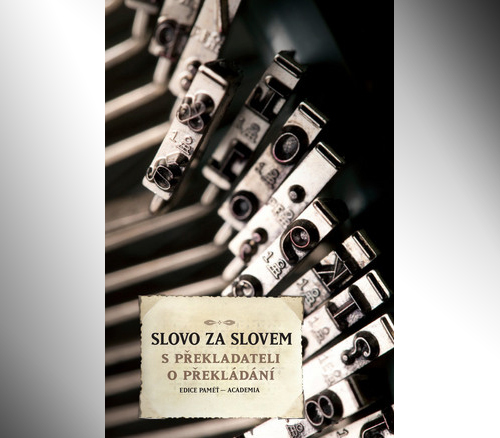
"Saroyan’s comparison of his grandmother’s mustache to Stalin’s had to be blacked out by the editor in the whole print run."
Czechoslovak history is closely connected to language and culture; it follows that translation, in particular, is a mighty revolutionary tool in times of oppression…
The twenty-seven interviews with the oldest generation of Czech translators collected in Word by Word (With Translators on Translating) reveal the personal histories of the people who, for more than half a century, were the arbiters of the literary masterworks available to thousands of Czech and Slovak readers.
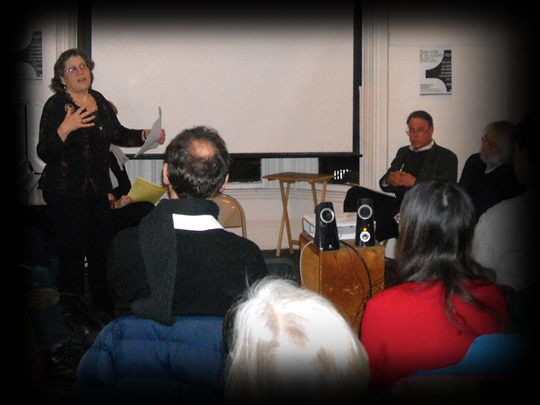
“The past is a foreign country. There is no native position from which a poem can be understood.”
In honor of our third anniversary, Asymptote’s Boston crew hosted “Translation in the Academy,” a conversation about the intersection of the growth of “translation studies” programs in universities and the praxis of professional translators. The panel was convened by our own contributing editor Ellen Elias-Bursac (along with plenty of help from Nina Beguš, Daniel Goulden, and Alex Sham!).
On the academic, translation-in-theory side of the ring: Karen Thornber, professor and current chair of Harvard University’s Department of Comparative Literature, and Edwin Gentzler, Director of the Translation Center at University of Massachusetts-Amherst. Representing translation in practice: Lloyd Schwartz, poet, active translator of Portuguese, and English professor at the University of Massachusetts-Boston, and Vivek Narayanan, poet and translator of Tamil. The panel was held at the Outpost 186 artspace in Cambridge, and true to Asymptote form, it was a room full of translators: of Japanese, of German, of Hebrew, and of Spanish, to name only a few of the languages represented in the diverse audience.